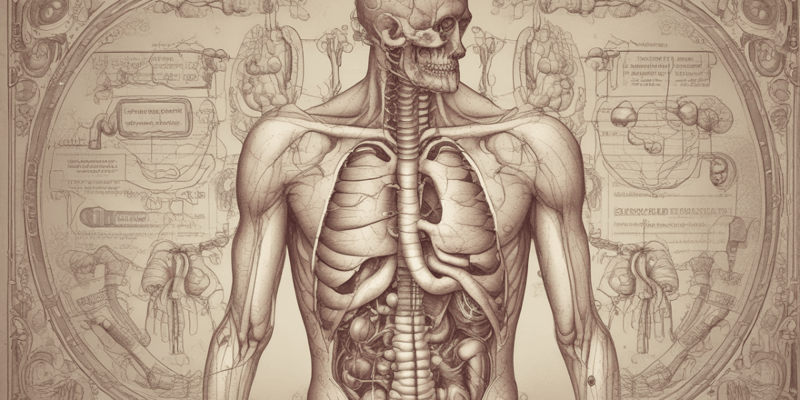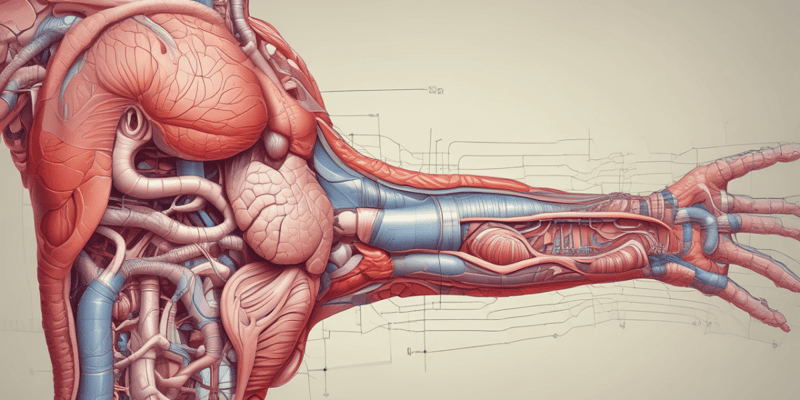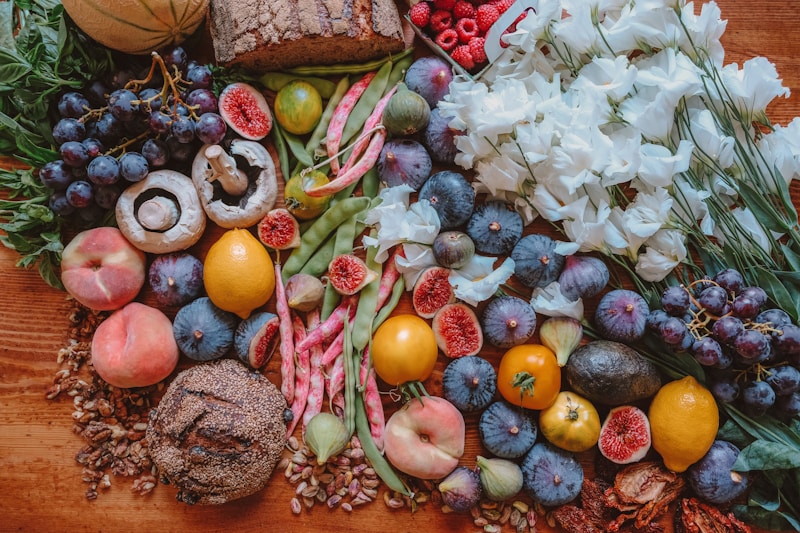Podcast
Questions and Answers
What is the primary function of the small intestine?
What is the primary function of the small intestine?
Which organ is responsible for producing bile?
Which organ is responsible for producing bile?
What is the function of the stomach muscles?
What is the function of the stomach muscles?
Which section of the small intestine receives chyme from the stomach?
Which section of the small intestine receives chyme from the stomach?
Signup and view all the answers
What is the function of the esophagus in the digestive system?
What is the function of the esophagus in the digestive system?
Signup and view all the answers
What is the resulting material after the small intestine has absorbed nutrients and water?
What is the resulting material after the small intestine has absorbed nutrients and water?
Signup and view all the answers
What is the function of the enzyme amylase in the digestive process?
What is the function of the enzyme amylase in the digestive process?
Signup and view all the answers
What is the process by which the esophagus pushes food down into the stomach?
What is the process by which the esophagus pushes food down into the stomach?
Signup and view all the answers
What is the name of the liquid or paste formed in the stomach after mixing food with digestive juices?
What is the name of the liquid or paste formed in the stomach after mixing food with digestive juices?
Signup and view all the answers
Which organ is responsible for secreting bile to aid in fat digestion?
Which organ is responsible for secreting bile to aid in fat digestion?
Signup and view all the answers
What is the role of the lower esophageal sphincter (LES) in the digestive process?
What is the role of the lower esophageal sphincter (LES) in the digestive process?
Signup and view all the answers
In which organ does the digestive process begin?
In which organ does the digestive process begin?
Signup and view all the answers
What is the primary function of the jejunum in the digestive system?
What is the primary function of the jejunum in the digestive system?
Signup and view all the answers
What is the purpose of the ileocecal valve?
What is the purpose of the ileocecal valve?
Signup and view all the answers
In which part of the small intestine does most chemical digestion and absorption occur?
In which part of the small intestine does most chemical digestion and absorption occur?
Signup and view all the answers
What organs release digestive secretions into the small intestine?
What organs release digestive secretions into the small intestine?
Signup and view all the answers
What is the function of the large intestine?
What is the function of the large intestine?
Signup and view all the answers
What is the last segment of the small intestine?
What is the last segment of the small intestine?
Signup and view all the answers
What is the function of the rectum in the digestive system?
What is the function of the rectum in the digestive system?
Signup and view all the answers
What is the purpose of the duodenum in the digestive system?
What is the purpose of the duodenum in the digestive system?
Signup and view all the answers
What is the name of the pouch attached to the cecum that is thought to function in the immune system?
What is the name of the pouch attached to the cecum that is thought to function in the immune system?
Signup and view all the answers
What is the role of the small intestine in the digestive system?
What is the role of the small intestine in the digestive system?
Signup and view all the answers
What is the primary function of the salivary glands in the digestive system?
What is the primary function of the salivary glands in the digestive system?
Signup and view all the answers
What is the mechanism by which the esophagus moves food into the stomach?
What is the mechanism by which the esophagus moves food into the stomach?
Signup and view all the answers
What is the stomach acid mixed with to create a semi-solid mixture?
What is the stomach acid mixed with to create a semi-solid mixture?
Signup and view all the answers
What is the main function of bile in the digestive system?
What is the main function of bile in the digestive system?
Signup and view all the answers
In which part of the digestive system does the majority of nutrient absorption occur?
In which part of the digestive system does the majority of nutrient absorption occur?
Signup and view all the answers
What is the purpose of the muscular contractions in the stomach?
What is the purpose of the muscular contractions in the stomach?
Signup and view all the answers
What is the role of the liver in the digestion of fats?
What is the role of the liver in the digestion of fats?
Signup and view all the answers
What is the primary function of the mouth in the digestive system?
What is the primary function of the mouth in the digestive system?
Signup and view all the answers
What is the name of the tube that connects the mouth to the stomach?
What is the name of the tube that connects the mouth to the stomach?
Signup and view all the answers
What is the result of the mixture of food with stomach enzymes and acids in the stomach?
What is the result of the mixture of food with stomach enzymes and acids in the stomach?
Signup and view all the answers
Why is creating a study schedule crucial for performing well on exams?
Why is creating a study schedule crucial for performing well on exams?
Signup and view all the answers
What is the recommended approach to creating a study schedule for exams?
What is the recommended approach to creating a study schedule for exams?
Signup and view all the answers
Why is it helpful to replicate test conditions while studying?
Why is it helpful to replicate test conditions while studying?
Signup and view all the answers
What is the purpose of creating own quizzes using study guides or lecture notes?
What is the purpose of creating own quizzes using study guides or lecture notes?
Signup and view all the answers
What is the benefit of using flashcards in studying?
What is the benefit of using flashcards in studying?
Signup and view all the answers
What is essential for studying subjects like math and physics?
What is essential for studying subjects like math and physics?
Signup and view all the answers
What is the benefit of documenting problem-solving attempts and explaining the thought process?
What is the benefit of documenting problem-solving attempts and explaining the thought process?
Signup and view all the answers
What is the purpose of the 'cheat card' exercise?
What is the purpose of the 'cheat card' exercise?
Signup and view all the answers
What determines how well one performs?
What determines how well one performs?
Signup and view all the answers
Why is it essential to incorporate breaks into the study schedule?
Why is it essential to incorporate breaks into the study schedule?
Signup and view all the answers
What is one of the best ways to calm test anxiety?
What is one of the best ways to calm test anxiety?
Signup and view all the answers
What is essential before seeking assistance?
What is essential before seeking assistance?
Signup and view all the answers
What should you prioritize when creating a study schedule for exams?
What should you prioritize when creating a study schedule for exams?
Signup and view all the answers
Why is it beneficial to study in the actual classroom or a similar environment?
Why is it beneficial to study in the actual classroom or a similar environment?
Signup and view all the answers
What is the recommended approach to preparing for math and physics exams?
What is the recommended approach to preparing for math and physics exams?
Signup and view all the answers
What is the purpose of simulating test conditions while studying?
What is the purpose of simulating test conditions while studying?
Signup and view all the answers
What is the benefit of using flashcards in studying?
What is the benefit of using flashcards in studying?
Signup and view all the answers
What should you try to get when replicating test conditions?
What should you try to get when replicating test conditions?
Signup and view all the answers
What is the benefit of explaining the thought process behind problem-solving attempts?
What is the benefit of explaining the thought process behind problem-solving attempts?
Signup and view all the answers
What is the purpose of creating a 'cheat card'?
What is the purpose of creating a 'cheat card'?
Signup and view all the answers
Why is it important to incorporate breaks into the study schedule?
Why is it important to incorporate breaks into the study schedule?
Signup and view all the answers
What determines how well one performs?
What determines how well one performs?
Signup and view all the answers
What technique involves explaining the problem to a non-expert?
What technique involves explaining the problem to a non-expert?
Signup and view all the answers
Why is it essential to ask for help only after trying to solve the problem on one's own?
Why is it essential to ask for help only after trying to solve the problem on one's own?
Signup and view all the answers
Study Notes
The Digestive System: Mouth, Esophagus, Stomach, Small Intestine, and Liver
The digestive system is a series of organs that work together to process the food and drinks we consume, extracting essential nutrients and waste products. The organs involved include the mouth, esophagus, stomach, small intestine, liver, pancreas, and gallbladder. In this article, we will focus on the mouth, esophagus, stomach, small intestine, and liver, and how they contribute to the digestive process.
Mouth
The digestive process begins in the mouth, where the food is chewed and mixed with saliva to form a soft mass called a bolus. Saliva contains enzymes, such as amylase, which break down starches into simple sugars. Chewing also facilitates the release of enzymes from the salivary glands.
Esophagus
The esophagus is a muscular tube that connects the throat to the stomach. It is responsible for transporting the food from the mouth to the stomach. The esophagus contracts in a process called peristalsis, pushing the food down the esophagus. A ring-like muscle called the lower esophageal sphincter (LES) relaxes to allow the food to enter the stomach and then contracts to prevent the food from flowing back into the esophagus, preventing acid reflux or heartburn.
Stomach
The stomach is a muscular organ that mixes food with digestive juices, including stomach acid and enzymes, to break down the food into a liquid or paste called chyme. The stomach muscles contract and relax to mix and churn the chyme, further breaking down the food. The stomach then releases the chyme into the small intestine.
Small Intestine
The small intestine is the primary site of nutrient absorption. It is about 20 feet long and has three sections: the duodenum, jejunum, and ileum. The duodenum, the first part of the small intestine, receives chyme from the stomach and further breaks it down using enzymes from the pancreas and bile from the liver. The jejunum and ileum are the middle and end sections of the small intestine, respectively. They are mainly responsible for absorbing nutrients into the bloodstream. The small intestine is where most of the water, bile, enzymes, and mucus are absorbed, eventually leaving behind a semi-solid or liquid material called chyme, which is then released into the large intestine.
Liver
The liver is a multi-functional organ that plays a crucial role in the digestive system. It produces bile, which is stored in the gallbladder and released into the small intestine to aid in the digestion of food, particularly fats. The liver also processes and purifies the blood, removing waste products from the bloodstream.
In conclusion, the digestive system, consisting of the mouth, esophagus, stomach, small intestine, liver, and other organs, is responsible for breaking down food into nutrients that our body can use for energy and growth. The organs work together to make this process efficient and essential for maintaining our health.
Studying That Suits You
Use AI to generate personalized quizzes and flashcards to suit your learning preferences.
Description
This quiz covers the digestive system, focusing on the roles of the mouth, esophagus, stomach, small intestine, and liver in processing food and extracting nutrients. Learn how these organs work together to break down food and maintain overall health.




